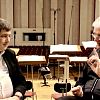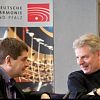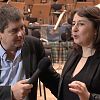backstage
MILOSLAV KABELÁČ - Symphony No.2
Miloslav Kabeláč ranks among the most significant Czech composers of the 20th century. Alongside Antonín Dvořák and Bohuslav Martinů, he is recognised as one of the greatest Czech symphonists, whose work represents a cornerstone of Czech musical heritage. His output encompassed practically all musical genres except opera, but at its core are eight symphonies, each with a unique orchestration. For this recording, the ORF Radio Symphony Orchestra enjoyed the welcome expertise of Czech conductor Jakub Hrůša, who meticulously articulated the richly orchestrated scores of this still underrated composer.
Recording: Vienna, 2023/2024 · Recording Supervision: Erich Hofmann · Recording Engineer: Friedrich Trondl · Publisher: Bärenreiter Praha · Producer: Johannes Kernmayer
Youtube
DMITRI SHOSTAKOVICH - The Symphonies
In their latest #ClassicalDiscoveries episode, Jens and Joe explore Shostakovich's symphonies—works of daring subversion masked as Soviet conformity. From the banned Fourth Symphony to the sardonic Ninth, they reveal how Shostakovich smuggled private rebellion into public music. Featuring Gürzenich-Orchester Köln's powerhouse recordings, this is Soviet-era genius at its most explosive. "Quiet in person, screaming in music." With: Jens F. Laurson (Journalist) · Johannes Kernmayer (Capriccio) · Martin Klebahn / 4tune Studios (Video Operator)
Youtube
CHARLES KOECHLIN - France's Hidden Symphonist
In their latest episode of their #ClassicalDiscoveries podcast, Jens and Joe take a look at the scintillating music of Charles Koechlin, a fascinating composer and forgotten French symphonist who is impossible to pigeonhole. Neither an impressionist, nor simply a romantic, dramatic, lyric, abstract, or descriptive composer, he combined revolutionary, academic, and eclectic traits. One second, he will display hints of Debussy and Ravel and the next sound like Poulenc, Florent Schmitt, or even Olivier Messiaen. With: Jens F. Laurson (Journalist) · Johannes Kernmayer (Capriccio) · Martin Klebahn / 4tune Studios (Video Operator)
Youtube
DMITRI SHOSTAKOVICH - The Film Music Scores
and many more
n their latest episode, Jens & Joe dive into the forgotten reels of Shostakovich’s film music, tackling anything from Italian partisans to Austrian invaders along the way – and wondering why everyone knows Prokofiev’s Ivan the Terrible, but not The Fall of Berlin. Plus: a well-earned shoutout to Dave at @DavesClassicalGuide. with: Jens F. Laurson (Journalist) · Johannes Kernmayer (Capriccio) · Martin Klebahn / 4tune Studios (Video Operator)
Youtube
EASTER CLASSICS - beyond J. S. Bach
anf many more
Easter marks the high point of the Christian year. It cannot be surprising, then, that some of the greatest compositions in classical music have been written to mark this feast. When today’s concert halls give a nod to Easter, Bach dominates programming. In their latest podcast, Jens and Joe explore some gems beyond Bach, from the age of the renaissance well into the 19th century.
with: Jens F. Laurson (Journalist) · Johannes Kernmayer (Capriccio) · Martin Klebahn / 4tune Studios (Video Operator)
Youtube
FRANZ SCHMIDT - beyond the "Seven Seals"
Franz Schmidt is not the most neglected composer among the 20th century grand romantics, but the discrepancy between the greatness of his music and his neglect in concert is staggering. Together with conductor Jonathan Bermann, who recently recorded Schmidt’s four symphonies with the BBC National Orchestra of Wales, Jens & Joe try to zero in on the phenomenon Schmidt and his music. with: Jonathan Bermann (Conductor) · Jens F. Laurson (Journalist) · Johannes Kernmayer (Capriccio) · Martin Klebahn / 4tune Studios (Video Operator)
Youtube
CHRISTIAN SINDING - The German Norwegian Composer
Discover the life and works of Christian Sinding, a Norwegian composer who spent most of his career in Germany. Learn about his symphonies, his place in late Romantic music, and why he's often overlooked in favor of his contemporary, Edvard Grieg.
Youtube
CHARLES KOECHLIN - Symphony No. 1, Op. 57bis.
Explore the fascinating journey of Charles Koechlin's First Symphony, from its century-long obscurity to a landmark recording. Discover the dedication of conductor Ariane Matiakh and the unique musical world of this French composer, blending Bachian counterpoint with impressionist flair.
Johannes Kernmayer (Producer / Interview) · Bern Hanke (Recording Supervision) · Philippe Ohl (Video Operator) · Axel Stummer (Video Edit)
Youtube
NINO ROTA - beyond The Godfather
Explore the life and works of Nino Rota, the Italian composer known for his film scores and classical compositions. Discover his collaborations with famous directors, his opera "The Florentine Straw Hat," and his unique ability to blend nostalgia, optimism, and humor in his music.
Youtube
MIKLÓS RÓZSA: Sinfonia concertante Op. 29
Discover the rarely performed symphonic masterpieces of Miklós Rózsa in this captivating release. Journey through the composer's musical evolution, from his early Rhapsody for Cello to the nostalgic Notturno Ungherese and the challenging Sinfonia concertante. Known for his iconic film scores like Ben-Hur, Rózsa's concert works showcase his true artistic depth. Experience the fiery passion of the Rhapsody for Cello, where Rózsa found his distinctive voice. Let the Notturno Ungherese transport you to the composer's childhood memories of Hungary. Marvel at the technical brilliance of the Sinfonia concertante, a work commissioned by legends Gregor Piatigorsky and Jascha Heifetz but never performed by them. Featuring the exceptional talents of cellist Harriet Krijgh and violinist Nikita Boriso-Glebsky, this recording brings Rózsa's underappreciated concert works to life. Immerse yourself in the rich, emotive world of one of the 20th century's most versatile composers. Don't miss this opportunity to explore the lesser-known side of Miklós Rózsa's musical genius. Like, comment, and subscribe for more hidden gems of classical music!















